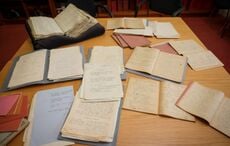Findmypast is working in partnership with IrishCentral to share fascinating insights into your Irish ancestors. Click here to get a special half price subscription, and discover your Irish roots today!
On Findmypast, you can explore a fascinating record collection for tracing your Irish war hero ancestors – World War 1 Irish Soldiers Wills. The men in these records left their belongings to their mothers, fathers, sisters and aunts more often than they left them to wives. Very few of the records mention specific bequests, they can have had little to leave behind other than the wages owed to them by the army. These small legacies were not the only mark they made. Taking the wills as a starting point, you can use other records to re-create something more of the lives of a few of the young men found in the WW1 Wills.
One intriguing bequest was made by William Ahern who died in Belgium in June 1916 a year after making his will. William was born in Roscommon. His father served with the Royal Irish Constabulary and was born in America. The family moved around a great deal, the census shows that they lived in Clare, Roscommon and Cork. In his will he left £1 13 shillings and 4p “to the widow of Driver H Jenkins of the Central Argentine railway”. William had borrowed the money from Jenkins and felt honour bound to return it to the man’s wife.
Another entry brought us to two brothers Peter and William Craig. Both served and died with the Dublin Fusiliers. William, the younger brother by 11 years died, aged 20, in France. His brother Peter died aged 30, also in France, just 13 months later. Both left their belongings to their mother at home in Dublin. The brothers can be seen in Ireland’s Memorial Record. Peter also shows up time and again in the Petty Sessions court registers & prison records. Nothing too serious! He is variously described as residing in Chapelizod, Palmerstown and Ballyfermot, all while living in the same house at St Laurence’s. He was caught a couple of times being “drunk and incapable”, quite normal for a young man but the law against public drinking was more rigidly enforced in the early 20th century, and Peter, unable to pay the fines, found himself jailed for periods of up to a month. On another occasion he was “cutting trees with intent”, it is not clear what he intended to do with the white thorn tree but his neighbour was not pleased. Not being able to pay the 10 shilling fine, he spent 7 days in Kilimainham Gaol. Harsh justice for damage valued at 2 shillings.
One young man who did have substantial property to leave was Francis J Collins. He appears to be the only solider leaving a motor car, he also left race-horses and farms to his brother, Michael. This makes you wonder if perhaps Francis was joking?! In the 1911 census a 26 year old Francis Joseph Collins can be found living with a George Monks, his cousin. Further research showed that their mothers’ were sisters. In the census Francis describes himself as a stationary [sic] packer. Might he have made his fortune in the intervening years?
These are just a few of the stories that can be told about the young Irishmen who died in WW1. Using historical records we can re-create the lives of these men who otherwise might be forgotten.
For more stories on tracing your Irish heritage from Findmypast click here.




Comments